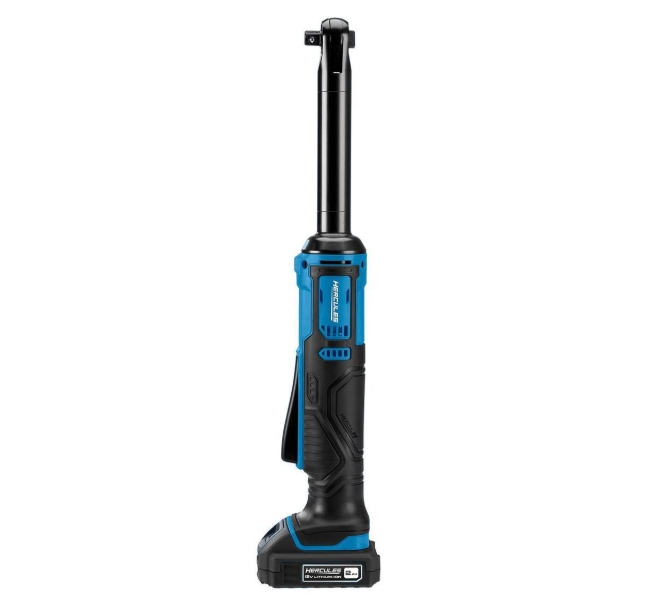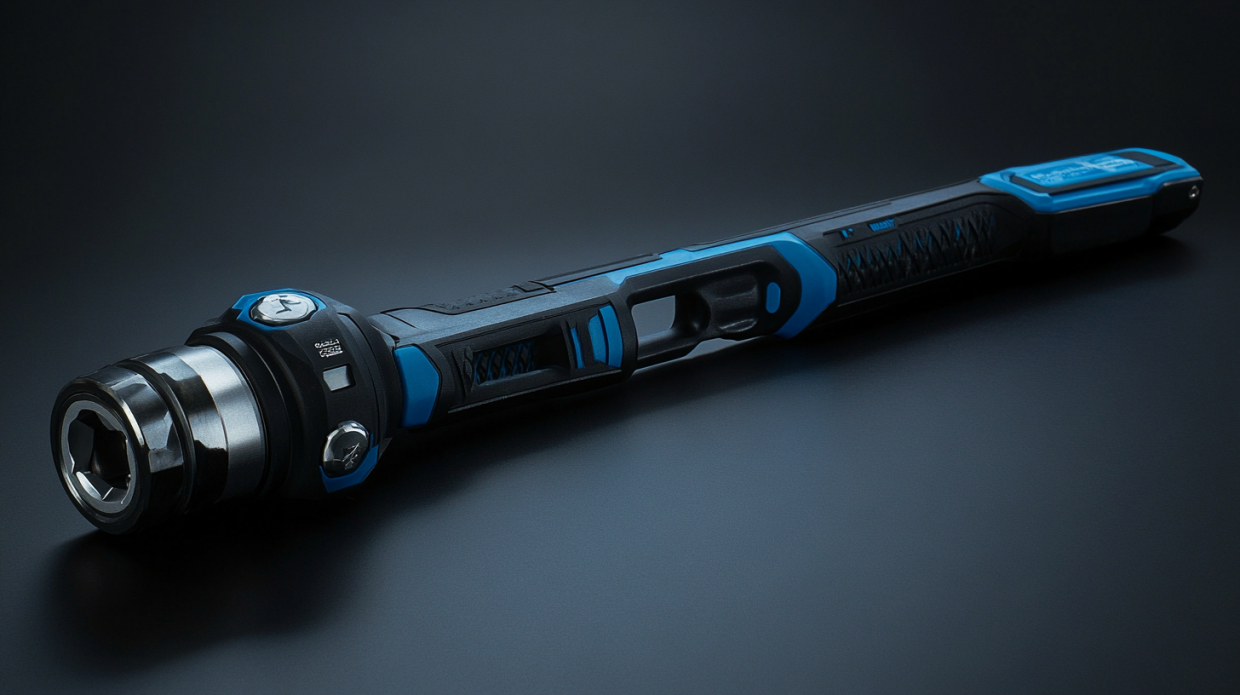
HERCULES 12V Cordless 3/8 in. Extended Reach Ratchet – Tool Only
- The HERCULES™ 12V Cordless 3/8 in. Extended Reach Ratchet delivers the power and speed of a pneumatic ratchet. The high power motor delivers 40 ft. lbs. of max torque at speeds of 275 RPM to remove the most stubborn fasteners. The compact, slim profile makes this ratchet wrench ideal for using in extra tight engine bays. Pair up with the HERCULES™ 2.0 Amp Hour battery pack to deliver more work per charge and more work over the life of the pack.
- 4 in. extended neck for greater accessibility in hard-to-reach areas
- 40 ft. lbs. of max torque and 275 RPM for the power and speed of a pneumatic ratchet
- All metal gearing for long tool life
- Built-in LED illuminates work area
- Reinforced steel housing for added durability and strong cranking force
- Oversized FWD/REV switch is easy to use wearing gloves
- Compact slim profile for use in extra-tight engine bays
- Rubberized overmold grip for ultimate comfort
- Variable speed paddle trigger for maximum control
$54.99
I still remember the first time I had to loosen that impossibly tight bolt under my car. There I was, knuckles bleeding, cursing the universe as my wrench slipped for the fifth time. That was before I discovered the game-changing tool that would forever transform my DIY projects: the Hercules Ratchet. After five years of using various models across countless projects, I’m sharing everything I’ve learned about this powerful yet underappreciated tool that deserves more recognition in every toolbox.
My Journey with the Mighty Hercules
Let me be completely honest with you—I was skeptical at first. Having grown up watching my father swear by his premium-brand tools, I wasn’t convinced a Hercules would stand up to the punishment I’d put it through. Fast forward to today, and I couldn’t imagine my workshop without one. The right ratchet can be the difference between a weekend project and a weekend nightmare.
What Exactly Is a Hercules Ratchet and Why Should You Care?
Before diving into specifics, let’s get clear on what we’re talking about. A Hercules Ratchet is a specialized hand tool manufactured under the Hercules brand (sold primarily through Harbor Freight Tools) that uses a mechanical mechanism allowing rotation in one direction while preventing reverse motion. This seemingly simple innovation revolutionizes how we work with nuts and bolts.
The magic happens in the ratcheting mechanism—that satisfying “click-click-click” sound as you move the handle back and forth. Unlike traditional wrenches that require you to reposition after each turn, a ratchet lets you maintain constant contact with the fastener while repositioning the handle. This means you can work in tight spaces where a full swing isn’t possible (like under a dashboard or deep in an engine bay).
For weekend warriors and professional mechanics alike, the Hercules line has become increasingly popular due to its balance of affordability and performance. While not as renowned as some premium brands, these tools have carved out their own loyal following.
Available Sizes: Finding Your Perfect Match
Hercules Ratchets come in a variety of drive sizes to accommodate different jobs:
- 1/4-inch drive: Perfect for light-duty work and precision tasks. These smaller ratchets excel in tight spaces where maneuverability is crucial. I use mine constantly for electronic enclosures and delicate automotive work.
- 3/8-inch drive: The versatile middle option—what I consider the “Goldilocks” size. Not too big, not too small. This is likely the size you’ll reach for most often, handling everything from automotive maintenance to home repairs.
- 1/2-inch drive: The workhorse for heavy-duty applications. When you need serious torque for stubborn bolts or major mechanical work, this is your go-to. I’ve used mine to break loose seized suspension components that smaller tools couldn’t budge.
- Specialty sizes: Less common but available are the miniature 1/8-inch drive for extremely delicate work and the massive 3/4-inch and 1-inch drives for industrial applications.
My personal recommendation? If you’re just starting out, grab the 3/8-inch drive first—it handles about 80% of common tasks. Add the 1/4-inch and 1/2-inch as your needs (and budget) expand.
Mastering the Art: How to Use a Hercules Ratchet Properly
Using a ratchet might seem intuitive, but there are techniques that will save you frustration and extend your tool’s life:
The Basics
- Direction selection: Every Hercules Ratchet features a direction switch. Familiarize yourself with how to toggle between tightening (clockwise) and loosening (counterclockwise) modes.
- Socket attachment: Push the socket firmly onto the square drive until you hear or feel it click into place. Many Hercules models feature a quick-release button to easily remove sockets.
- Proper angle: For maximum leverage and to prevent mechanism damage, try to keep the ratchet as perpendicular to the fastener as possible.
- Short swings: One of the ratchet’s biggest advantages is that you don’t need full rotations. In tight spaces, even 10-degree movements will advance your work.
Advanced Techniques
After years of use, I’ve developed some habits that serve me well:
- Two-finger finesse: For final tightening, hold the handle with just two fingers rather than a full grip. This naturally limits torque and prevents overtightening.
- The extension trick: When working deep in an engine bay, combine a Hercules Ratchet with the appropriate extension. This creates a flexible tool that can navigate around obstacles.
- The palm technique: For rapid loosening of already broken fasteners, cup the handle in your palm and spin it like a top. Much faster than individual clicks!
Remember, a ratchet is primarily designed for speed and access—not for breaking loose extremely tight fasteners. For that initial break, consider a breaker bar or impact wrench before switching to your ratchet.
Torque Talk: Understanding Capacity Limits
One of the most misunderstood aspects of ratchets is their torque capacity. Hercules doesn’t typically advertise specific torque ratings for their hand ratchets, but understanding the general limits is crucial to prevent damage.
As a rule of thumb:
- 1/4-inch drive: Generally limited to about 30-40 ft-lbs
- 3/8-inch drive: Can typically handle 80-100 ft-lbs
- 1/2-inch drive: Usually rated for 150-200 ft-lbs
That said, these are approximate guidelines. The actual breaking point depends on:
- The specific model
- The age and condition of the tool
- The angle of force application
- Temperature conditions
From personal experience, I’ve found that Hercules Ratchets generally offer torque capacity comparable to mid-range brands, though perhaps not quite reaching the extremes of premium professional lines.
For their cordless power ratchets, Hercules typically provides more specific torque ratings. Their 12V cordless model, for instance, delivers around 35 ft-lbs of torque, making it suitable for light to medium-duty tasks.
Where to Buy: Getting Your Hands on a Hercules
Hercules is a proprietary brand of Harbor Freight Tools, which limits where you can purchase these tools. Your options include:
- Harbor Freight physical stores: With over 1,000 locations across the United States, there’s likely one near you. The advantage here is being able to physically handle the tools before purchasing.
- Harbor Freight online store: Convenient for those without a nearby store, though you’ll miss the tactile experience of testing the ratchet’s action.
- Secondary markets: While not officially sold elsewhere, you can find Hercules tools on platforms like eBay or Facebook Marketplace. Just be cautious about counterfeits and condition issues.
Occasionally, Harbor Freight runs significant sales on Hercules tools. I’ve seen discounts of 20-30% during major holidays, so timing your purchase can save you money.
Pro tip: Sign up for Harbor Freight’s email list or download their app to get notifications about Hercules promotions and exclusive coupons.
Durability Factor: Can Hercules Handle the Heavy Lifting?
This is perhaps the most common question I receive about Hercules tools. Based on my extensive use, the answer is a qualified yes. While they may not be designed for daily professional abuse in industrial settings, they’re robust enough for serious DIY work and even light professional use.
The Hercules line represents Harbor Freight’s premium tier, offering significantly better durability than their budget options. The ratchets feature:
- Chrome vanadium steel construction
- Heat-treated components for strength
- 90-tooth mechanisms in many models (offering better precision than 72-tooth alternatives)
- Sealed heads to prevent contamination
I’ve had my Hercules 3/8-inch ratchet for over four years now, using it weekly for everything from brake jobs to furniture assembly. The chrome finish has some battle scars, but the mechanism remains smooth and reliable. That said, I’ve heard from heavy-duty professional users that they might see wear after a year or two of daily abuse.
For prosumers and weekend mechanics, a Hercules Ratchet should provide years of service when properly maintained.
The Brand Battle: Hercules vs. Premium Competitors
Let’s address the elephant in the room—how does Hercules stack up against established brands like Milwaukee, DeWalt, Snap-on, or Mac Tools?
Price Point
Hercules typically costs 30-50% less than premium brands for comparable tools. For example:
- Hercules 3/8″ ratchet: ~$25-30
- Milwaukee 3/8″ ratchet: ~$40-50
- Snap-on 3/8″ ratchet: ~$100-120
Build Quality
Premium brands generally offer:
- Finer tolerances
- More consistent quality control
- Higher-grade materials in some components
- Better finishes that resist corrosion longer
However, the gap has narrowed significantly in recent years. Hercules tools now feature many of the same materials and construction techniques as their more expensive counterparts.
Warranty and Support
This is where premium brands still maintain an edge:
- Snap-on offers lifetime warranties with on-site service
- Milwaukee provides extensive service networks
- Hercules offers a 90-day satisfaction guarantee and limited warranties (typically 1-2 years depending on the specific tool)
My Verdict
After using both premium and Hercules tools, I’ve settled on this perspective: For professionals whose livelihood depends on their tools daily, the premium brands may justify their cost through slightly better reliability and superior service.
For everyone else—from serious DIYers to occasional professionals—Hercules offers approximately 90-95% of the performance at 50-70% of the cost. That’s a value proposition that’s hard to ignore.
Materials Matter: What Goes Into a Hercules Ratchet
The materials used in a ratchet directly impact its performance, durability, and feel. Hercules Ratchets typically feature:
Handle Construction
Most Hercules Ratchets use chrome vanadium steel for the handle, providing excellent strength-to-weight ratio. The handles are typically chrome-plated for corrosion resistance and easy cleaning.
Internal Components
The ratcheting mechanism consists of:
- A gear or “cog” with precision-cut teeth
- A pawl that engages with these teeth
- A directional selector
- Springs to maintain tension
These components are typically made from hardened steel to withstand the repeated stress of engagement.
Grip Materials
Depending on the model, you’ll find:
- Knurled metal grips on basic models
- Dual-material comfort grips on premium versions, combining hard plastic with softer rubberized sections
One material-related observation from my experience: the chrome plating on Hercules tools seems slightly thinner than on premium brands. After several years of use, you may notice some finish wear that appears earlier than on more expensive alternatives. However, this is primarily cosmetic and doesn’t generally affect functionality.
Warranty Details: What’s Covered and What’s Not
Understanding warranty coverage is crucial when investing in tools. For Hercules Ratchets, the warranty situation is straightforward but limited compared to lifetime-warranty brands:
Hercules hand tools typically come with:
- 90-day satisfaction guarantee (return for any reason)
- Limited warranty against defects (usually 1-2 years)
For power tools in the Hercules line, including their cordless ratchets, the coverage extends to:
- 90-day satisfaction guarantee
- 2-year limited warranty against defects
What’s notably missing is the lifetime warranty offered by some competing brands. However, this is reflected in the substantially lower price point.
In my experience with warranty claims, Harbor Freight’s process is simple but requires visiting a store:
- Bring the defective tool
- Provide proof of purchase when possible (though they can often look up recent purchases)
- Either receive an immediate replacement or store credit
I’ve had to use this process once when a selector switch became sticky on my ratchet. The store replaced it without hassle, though I did have to make the trip to a physical location.
Key Features That Set Hercules Ratchets Apart
Not all ratchets are created equal. Here are the standout features I’ve come to appreciate in the Hercules line:
High Tooth Count
Many Hercules Ratchets feature 90-tooth mechanisms, meaning they require just 4 degrees of swing to advance to the next position. This is invaluable in tight spaces and compares favorably to budget tools that might offer only 36 or 45 teeth.
Slim Head Design
Particularly on their newer models, Hercules has prioritized slim head profiles that can access restricted areas more easily than bulkier competitors.
Dual-Material Comfort Grip
The premium Hercules models feature ergonomic handles with dual-material construction—a hard inner core for strength with a softer outer layer for comfort and grip.
Full Polish Finish
Unlike some economy tools that might have rough edges or unfinished surfaces, Hercules Ratchets typically feature fully polished finishes that are both aesthetically pleasing and less likely to snag on surrounding components.
Sealed Head Design
Many models feature sealed head designs that help prevent contamination from dirt, debris, and moisture—extending the service life significantly.
Quick-Release Mechanisms: A Time-Saving Feature
One feature that deserves special attention is the quick-release mechanism found on most Hercules Ratchets. This small but significant innovation allows you to press a button on the back of the ratchet head to instantly release the socket.
The benefits include:
- Faster socket changes (especially valuable when working through a sequence of different-sized fasteners)
- Easier operation with oily or gloved hands
- Reduced risk of dropping sockets in hard-to-reach areas
I’ve found the Hercules quick-release button to be responsive and durable. After years of use, it continues to function reliably, which isn’t always the case with budget tools where this feature can become sticky or unresponsive.
The mechanism works with both standard and deep sockets, though I’ve occasionally found it grips aftermarket sockets with slightly different tolerances less securely than those from major manufacturers.
Price Range: What to Expect at the Register
Hercules Ratchets occupy a middle ground in the pricing spectrum—not as expensive as professional brands but typically costing more than Harbor Freight’s budget lines like Pittsburgh.
As of my last purchase, here’s what you could expect to pay (before any sales or coupons):
- 1/4-inch drive Hercules Ratchet: $19.99 – $24.99
- 3/8-inch drive Hercules Ratchet: $24.99 – $29.99
- 1/2-inch drive Hercules Ratchet: $29.99 – $34.99
- Hercules Cordless Ratchet (12V): $79.99 – $99.99 (depending on whether batteries are included)
Complete sets with multiple drive sizes often provide better value, with three-piece sets (1/4″, 3/8″, and 1/2″) typically priced around $69.99 – $79.99.
Harbor Freight frequently runs promotions on Hercules tools. I’ve seen discounts of up to 30% during major sales events, bringing the prices even closer to budget options while maintaining the superior quality.
Real Talk: What Users Are Saying in Reviews
I’ve not only used these tools myself but also spoken with dozens of other users and reviewed online feedback. Here’s a balanced summary of what the Hercules Ratchet community is saying:
The Praise
- Value proposition: Many users cite the exceptional quality-to-price ratio
- Tooth count: The 90-tooth mechanisms receive consistent praise for their fine movement
- Comfort: The ergonomic handles are frequently mentioned as superior to other tools in this price range
- Weight balance: Several reviewers note the tools feel “substantial without being heavy”
The Criticisms
- Warranty limitations: The most common complaint compares the limited warranty unfavorably to lifetime guarantees from other brands
- Availability issues: Some users report difficulty finding specific models in stock
- Finish durability: A few long-term users note the chrome finish showing wear earlier than premium brands
- Cordless power: For the powered ratchets, some users wish for more torque comparable to premium brands
The overall consensus aligns with my personal experience: for the price point, Hercules Ratchets deliver performance that satisfies most users’ needs, with limitations that primarily affect heavy professional use cases.
Maintenance Mastery: Keeping Your Hercules Ratchet in Prime Condition
Proper maintenance dramatically extends the life of any tool. For Hercules Ratchets, I’ve developed a simple routine that has kept mine performing like new:
Regular Cleaning
After use, especially in dirty or wet environments:
- Wipe down the entire tool with a clean cloth
- Use compressed air to blow out any debris from the head mechanism
- Apply a light wipe of WD-40 to the metal surfaces to prevent rust (but don’t spray directly into the mechanism)
Deep Cleaning (Every 6-12 Months)
For tools that see regular use:
- Use a degreasing cleaner like Simple Green to remove old oil and contaminants
- Dry thoroughly with compressed air
- Apply a drop or two of lightweight machine oil to the moving parts
- Work the mechanism back and forth to distribute the lubricant
- Wipe away any excess oil
What to Avoid
- Submerging the ratchet in water or cleaning solutions
- Using excessive lubricant that can attract dirt
- Applying heat (like from a heat gun) when trying to loosen stuck mechanisms
- Using the ratchet as a hammer or pry bar (we’ve all been tempted!)
With proper care, my oldest Hercules Ratchet is still performing smoothly after five years of regular weekend use. The most common failure point tends to be the directional selector mechanism, which can become sticky or less positive in its engagement over time.
Automotive Applications: A Perfect Match for Car Enthusiasts
As someone who regularly works on vehicles, I can confidently say that automotive repair is where Hercules Ratchets truly shine. Their combination of accessibility, versatility, and durability makes them ideal for everything from basic maintenance to deeper mechanical work.
Ideal Automotive Applications
- Oil changes: The 3/8-drive with a short extension is perfect for drain plugs and filter caps
- Brake work: The fine tooth count allows precise movement in tight wheel well spaces
- Intake manifold access: The slim head design helps reach those impossible bolts behind components
- Interior dashboard work: The 1/4-inch drive excels at removing trim fasteners without damage
One particular project stands out in my memory—replacing the heater core in my wife’s sedan. This notorious job requires removing most of the dashboard, with dozens of fasteners in awkward positions. The Hercules 1/4-inch ratchet’s slim profile and fine movement made a nightmare job merely unpleasant. A bulkier tool would have added hours to the project.
For modern vehicles with tight engine bays, the Hercules cordless ratchet is a game-changer. It’s slim enough to access restricted areas but powerful enough to handle most fasteners you’ll encounter.
Distinguishing Features: Ratchets vs. Other Hand Tools
To appreciate what makes ratchets special, it helps to understand how they differ from other similar tools:
Ratchet vs. Wrench
- Movement: Ratchets allow continuous turning without removing the tool from the fastener
- Access: Ratchets require less swing arc than wrenches
- Adaptability: With various socket sizes, a single ratchet handle replaces dozens of wrenches
- Size: Ratchets are typically bulkier than comparable wrenches
Ratchet vs. Breaker Bar
- Mechanism: Ratchets have moving parts; breaker bars are solid
- Strength: Breaker bars can typically handle more torque without damage
- Length: Breaker bars are usually longer for additional leverage
- Convenience: Ratchets offer one-hand operation; breaker bars require repositioning
Ratchet vs. Screwdriver
- Torque: Ratchets deliver significantly more torque than screwdrivers
- Fastener types: Ratchets primarily work with nuts and bolts; screwdrivers with screws
- Precision: Screwdrivers offer better control for delicate fasteners
- Size: Ratchets are larger and less suitable for precision electronics work
The Hercules lineup includes all these tool types, allowing you to select the right option for each specific task.
Power and Speed: The Cordless Hercules Ratchet Option
While this guide focuses primarily on hand ratchets, Hercules also offers cordless power ratchets that deserve mention. These battery-powered tools combine the accessibility of traditional ratchets with motorized operation.
The current Hercules 12V cordless ratchet specifications include:
- Maximum torque: 35 ft-lbs
- No-load speed: 0-260 RPM
- Drive size: 3/8-inch (with 1/4-inch models also available)
- Battery: 12V lithium-ion (interchangeable with other Hercules 12V tools)
I’ve found the cordless version particularly useful for repetitive tasks like removing valve covers or oil pans with multiple identical fasteners. The 35 ft-lbs of torque won’t break free seriously stuck bolts, but it’s perfect for run-of-the-mill fasteners that have already been broken loose.
The variable speed trigger provides good control, allowing you to start slowly and increase speed as needed. Battery life is respectable—I typically get through several moderate projects on a single charge.
Socket Compatibility: Universal Fit or Proprietary Design?
Good news for those with existing socket collections—Hercules Ratchets use standard drive sizes compatible with virtually any brand of sockets. This means:
- Standard 1/4-inch drive sockets fit Hercules 1/4-inch ratchets
- Standard 3/8-inch drive sockets fit Hercules 3/8-inch ratchets
- Standard 1/2-inch drive sockets fit Hercules 1/2-inch ratchets
This compatibility extends to accessories like:
- Extensions
- Universal joints
- Adapters
- Breaker bars
I’ve successfully used sockets from brands including Craftsman, DeWalt, Husky, and even premium Snap-on sockets with my Hercules Ratchets without any fitment issues.
The only minor compatibility concern I’ve encountered relates to the ball-detent strength in the quick-release mechanism. Some aftermarket sockets with slightly different tolerances may fit either too tightly or too loosely. This is rarely a functional problem but can occasionally be annoying.
Replacement Parts: Extending the Lifespan
Unlike some premium brands that offer individual replacement components, Hercules tools generally follow a complete replacement model rather than a repair part system. This means:
- Individual internal components (pawls, springs, etc.) are not typically sold separately
- Complete replacement tools are the standard solution for failures
However, there are some exceptions and workarounds:
- Comfort grip handles sometimes can be replaced if damaged
- Harbor Freight’s generous warranty often means a complete replacement is simpler than seeking parts
- Some third-party repair specialists can service Hercules tools, though this is rarely cost-effective
This approach aligns with the price point—at $25-35 for a complete new tool, the economics of individual component repair make less sense than with $100+ professional tools.
For the cordless models, batteries and chargers are readily available as separate purchases, allowing you to expand your runtime without buying complete new tool sets.
Value Verdict: Are Hercules Ratchets Worth the Price?
After years of personal use and countless conversations with other tool users, I’ve developed a clear perspective on the value question.
Who Should Absolutely Buy Hercules Ratchets
- Serious DIYers and weekend mechanics: The quality-to-price ratio is exceptional for this user group
- Professionals with budget constraints: Those starting a business or needing backup tools
- Occasional users who still want quality: Why spend premium prices for tools used monthly?
- Those with mixed brand loyalties: If you’re not committed to a single brand ecosystem
Who Might Want to Look Elsewhere
- Daily professional users in demanding environments: The slightly better durability of premium brands might justify their cost
- Those who prioritize lifetime warranties: If you value never having to replace a tool, premium brands offer this peace of mind
- Users who need specialized service support: Some premium brands offer on-site service that Hercules doesn’t match
In raw performance terms, Hercules Ratchets deliver approximately 90% of premium brand performance at roughly 40-50% of the cost. For most users, this represents an excellent value proposition.
I’ve personally outfitted my home workshop primarily with Hercules tools, while maintaining a few strategic premium pieces for daily professional use. This hybrid approach has served me well, balancing performance needs with budget realities.
Conclusion: My Final Thoughts After Years with Hercules
When I first purchased a Hercules Ratchet, I viewed it as a stopgap until I could afford “real” tools. Five years later, that “temporary” tool has become a trusted companion through countless projects. While some of my tools have been upgraded to premium brands, my Hercules Ratchets remain in daily rotation—a testament to their enduring value.
The tool market has evolved significantly, with the quality gap between mid-tier and premium brands narrowing while the price gap remains substantial. Hercules has positioned itself nicely in this new reality, offering tools that satisfy the vast majority of users’ needs without breaking the bank.
For those still on the fence, my recommendation is simple: start with a Hercules 3/8-inch drive ratchet for around $25-30. Use it for a few months on real projects. I suspect you’ll be pleasantly surprised by the experience and may find yourself questioning, as I did, whether those premium brands are really worth the substantial price premium for your particular needs.
In a world of increasingly expensive tools, Hercules offers a refreshing combination of performance and value that deserves serious consideration from anyone who works with their hands. The right tool doesn’t have to break the bank to break loose stubborn bolts.
What’s your experience with Hercules tools? I’d love to hear other perspectives in the comments below.







